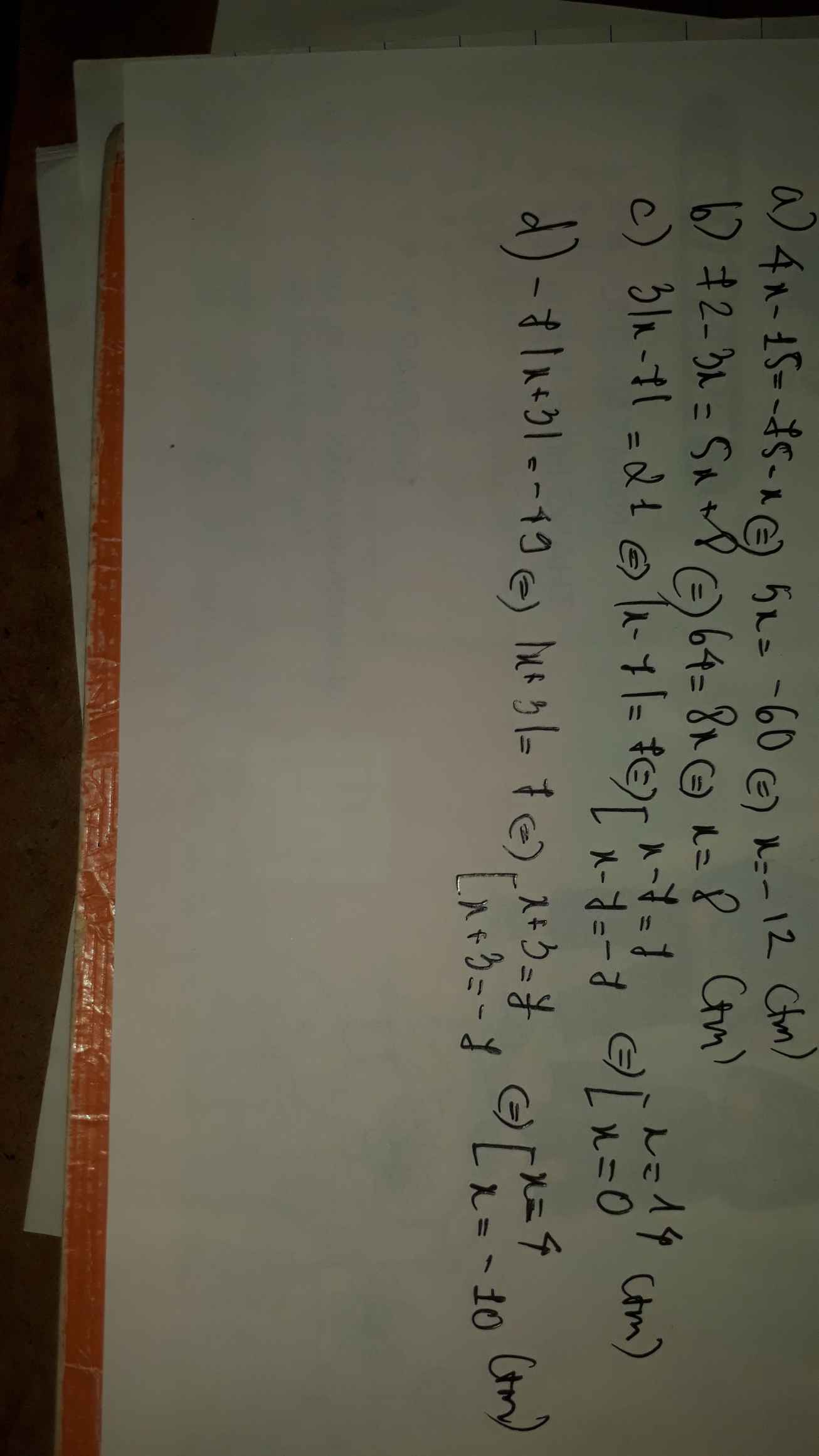4x+2-15=49
Hãy nhập câu hỏi của bạn vào đây, nếu là tài khoản VIP, bạn sẽ được ưu tiên trả lời.


a) 15-(49-4x)=3x-27
<=> 15-49+4x=3x-27
<=> -34+4x-3x=-27
<=> x=-27+34=7
Vậy x=7
b) 70-(x-37)-(-61)=14-2x
<=> 70-x+34+61=14-2x
<=> 120-x+2x=14
<=> x=120-14=106
Vậy x=106

Tìm GTLN:
\(A=-x^2+6x-15\)
\(=-\left(x^2-6x+15\right)\)
\(=-\left(x^2-2.x.3+9+6\right)\)
\(=-\left(x+3\right)^2-6\le0\forall x\)
Dấu = xảy ra khi:
\(x-3=0\Leftrightarrow x=3\)
Vậy Amax = - 6 tại x = 3
Tìm GTNN :
\(A=x^2-4x+7\)
\(=x^2+2.x.2+4+3\)
\(=\left(x+2\right)^2+3\ge0\forall x\)
Dấu = xảy ra khi:
\(x+2=0\Leftrightarrow x=-2\)
Vậy Amin = 3 tại x = - 2
Các câu còn lại làm tương tự nhé... :)

a) ( 2x + 3 )^2 - 4( x - 1 )( x + 1 ) = 49
=>4x2+12x+9-4x2+4=49
=>12x+13=49
=>12x=36
=>x=3
b) 16x^2 - ( 4x - 5 )^2 = 15
=>16x2-16x2+40x-25=15
=>40x-25=15
=>40x=40
=>x=1
c) ( 2x + 1 )^2 - ( x - 1)^2 = 0
=>4x2+4x+1-x2+2x-1=0
=>3x2+6x=0
=>3x(x+2)=0
=>3x=0 hoặc x+2=0
=>x=0 hoặc x=-2
a) \(\left(2x+3\right)^2-4\left(x-1\right)\left(x+1\right)=49\\ =>4x^2+12x+9-4x^2+4=49\\=>12x+13=49\\ =>12x=36\\ =>x=3\)
b) \(16x^2-\left(4x-5\right)^2=15\\ =>16x^2-16x^2+40x-25=15\\ =>40x-25=15\\ =>40x=40\\ =>x=1\)
c) \(\left(2x+1\right)^2-\left(x-1\right)^2=0\\ =>4x^2+4x+1-x^2+2x-1=0\\ =>3x^2+6x=0\\ =>3x\left(x+2\right)=0\\ =>\left[\frac{3x=0}{x+2=0}\right]=>\left[\frac{x=0}{x=-2}\right]\)

a: Ta có: \(\left(x+2\right)\left(x^2-2x+4\right)-x\left(x^2+2\right)=15\)
\(\Leftrightarrow x^3+8-x^3-2x=15\)
\(\Leftrightarrow2x=-7\)
hay \(x=-\dfrac{7}{2}\)
b: Ta có: \(\left(x-2\right)^3-\left(x-4\right)\left(x^2+4x+16\right)+6\left(x+1\right)^2=49\)
\(\Leftrightarrow x^3-6x^2+12x-8-x^3+64+6\left(x+1\right)^2=49\)
\(\Leftrightarrow-6x^2+12x+56+6x^2+12x+6=49\)
\(\Leftrightarrow24x=-13\)
hay \(x=-\dfrac{13}{24}\)

TÌM GIÁ TRỊ NHỎ NHẤT CỦA BIỂU THỨC:
1) \(x^2+8\)
Gọi biểu thức trên là A.
Nhận xét; \(x^2\ge0\forall x\)
\(\Rightarrow x^2+8\ge8\forall x\)
Vậy \(minA=8\) khi \(x^2=0\)\(\Rightarrow x=0\)
KL: Vậy \(minA=8\) khi \(x=0\)
2) \(2x^2+4x+15\)
\(\Rightarrow2x^2+4x+1+14\)
\(\Rightarrow\left(2x^2+1\right)^2+14\)
Gọi biểu thức trên là B.
Nhận xét: \(\left(2x^2+1\right)^2\ge0\forall x\)
\(\Rightarrow\left(2x^2+1\right)^2+14\ge14\forall x\)
Vậy \(minB=14\) khi \(\left(2x^2+1\right)^2=0\)\(\Rightarrow2x^2+1=0\)\(\Rightarrow2x^2=1\)\(\Rightarrow x=\sqrt{\frac{1}{2}}\)
KL: Vậy \(minB=14\) khi \(x=\sqrt{\frac{1}{2}}\)
Tìm giá trị nhỏ nhất của biểu thức bạn AKIWA MAIYA làm rồi .
Chứng minh biểu thức luôn âm với mọi x
a) \(-x^2+2x-7\)
\(=-\left(x^2-2x+7\right)\)
\(=-\left(x^2-2.x.1+1^2+7\right)\)
\(=-\left[\left(x-1\right)^2+7\right]\)
Vì \(-\left[\left(x-1\right)^2+7\right]< 0\)
=> Biểu thức trên nhận giá trị âm với mọi x .
b) Tương tự

a, Xem lại đề:
b, \(16x^2-\left(4x-5\right)^2=15\)
\(\Rightarrow16x^2-\left(16x^2-40x+25\right)=15\)
\(\Rightarrow16x^2-16x^2+40x-25=15\)
\(\Rightarrow40x=40\Rightarrow x=1\)
Chúc bạn học tốt!!!
\(a.\:\left(7x+3\right)^2-4\left(x-1\right)\left(x+1\right)=49\\ 49x^2+42x+9-4x^2+4=49\\ 45x^2+42x+13=49\\ x^2+\dfrac{42}{45}x+\dfrac{13}{45}=\dfrac{49}{45}\\ x^2+2.\dfrac{7}{15}x+\left(\dfrac{7}{15}\right)^2=\dfrac{49}{45}-\dfrac{13}{45}+\left(\dfrac{7}{15}\right)^2\\ \left(x+\dfrac{7}{15}\right)^2=\dfrac{229}{225}\\ \Rightarrow\left[{}\begin{matrix}x+\dfrac{7}{15}=\dfrac{229}{225}\\x+\dfrac{7}{15}=-\dfrac{229}{225}\end{matrix}\right.\Rightarrow\left[{}\begin{matrix}x=\dfrac{124}{225}\\x=-\dfrac{334}{225}\end{matrix}\right.\)

a, 4x -15=-75-x b,72-3x= 5x+8
4x+x=-75+15 -3x-5x=8-72
5x=-60 -8x=-64
x=-60:5 8x=64
x=-14 x=64:8
x=8
c,3Ix-7I=21 d,-7Ix+3I=-49
Ix-7I=21:3 Ix+3I=-49:-7
Ix-7I=7 Ix+3I=7
x-7=7 hoặc x-7=-7 x+3=7 hoặc x+3=-7
x=14 hoặc x=0 x=4 hoặc x=-10

a) ĐK : \(x\ge1\)
pt <=> \(\sqrt{3^2\left(x-1\right)}-\frac{1}{2}\sqrt{2^2\left(x-1\right)}=2\)
<=> \(\left|3\right|\sqrt{x-1}-\frac{1}{2}\cdot\left|2\right|\sqrt{x-1}=2\)
<=> \(3\sqrt{x-1}-1\sqrt{x-1}=2\)
<=> \(2\sqrt{x-1}=2\)
<=> \(\sqrt{x-1}=1\)
<=> \(x-1=1\)=> \(x=2\)( tm )
b) \(3x-\sqrt{49-14x+x^2}=15\)
<=> \(\sqrt{x^2-14x+49}=3x-15\)
<=> \(\sqrt{\left(x-7\right)^2}=3x-15\)
<=> \(\left|x-7\right|=3x-15\)(1)
Với x < 7
(1) <=> 7 - x = 3x - 15
<=> -x - 3x = -15 - 7
<=> -4x = -22
<=> x = 11/2 ( tm )
Với x ≥ 7
(1) <=> x - 7 = 3x - 15
<=> x - 3x = -15 + 7
<=> -2x = -8
<=> x = 4 ( ktm )
Vậy x = 11/2
a) \(ĐKXĐ:x\ge1\)
\(\sqrt{9x-9}-\frac{1}{2}\sqrt{4x-4}=2\)
\(\Leftrightarrow\sqrt{9.\left(x-1\right)}-\frac{1}{2}.\sqrt{4\left(x-1\right)}=2\)
\(\Leftrightarrow3\sqrt{x-1}-\frac{1}{2}.2\sqrt{x-1}=2\)
\(\Leftrightarrow3\sqrt{x-1}-\sqrt{x-1}=2\)
\(\Leftrightarrow2\sqrt{x-1}=2\)
\(\Leftrightarrow\sqrt{x-1}=1\)
\(\Leftrightarrow x-1=1\)\(\Leftrightarrow x=2\)( thỏa mãn ĐKXĐ )
Vậy phương trình có nghiệm là \(x=2\)
b) \(3x-\sqrt{49-14x+x^2}=15\)
\(\Leftrightarrow3x-\sqrt{\left(7-x\right)^2}=15\)
\(\Leftrightarrow3x-\left|7-x\right|=15\)
+) TH1: Nếu \(7-x< 0\)\(\Leftrightarrow x>7\)
thì \(3x-\left(x-7\right)=15\)
\(\Leftrightarrow3x-x+7=15\)\(\Leftrightarrow2x=8\)
\(\Leftrightarrow x=4\)( không thỏa mãn )
+) TH2: Nếu \(7-x\ge0\)\(\Leftrightarrow x\le7\)
thì \(3x-\left(7-x\right)=15\)
\(\Leftrightarrow3x-7+x=15\)
\(\Leftrightarrow4x=22\)\(\Leftrightarrow x=\frac{22}{4}\)( thỏa mãn ĐKXĐ )
Vậy nghiệm của phương trình là \(x=\frac{22}{4}\)

Bài 2:
a: \(A=x^2+8>=8\)
Dấu '=' xảy rakhi x=0
b: \(B=2\left(x^2+2x+\dfrac{15}{2}\right)\)
\(=2\left(x^2+2x+1+\dfrac{13}{2}\right)=2\left(x+1\right)^2+13>=13\)
Dấu '=' xảy ra khi x=-1

Mình làm 5 câu thôi nhé !:
1) \(7^x\cdot49=7^{90}\)
\(\Rightarrow7^x\cdot7^2=7^{90}\)
\(\Rightarrow7^{x+2}=7^{90}\)
\(\Rightarrow x=90-2\)
\(\Rightarrow x=88\)
2) \(2^x\cdot4=128\)
\(\Rightarrow2^x\cdot2^2=2^7\)
\(\Rightarrow2^{x+2}=2^7\)
\(\Rightarrow x=7-2\)
\(\Rightarrow x=5\)
3) \(3^x-1=2^4\cdot5\)
\(\Rightarrow3^x=80+1\)
\(\Rightarrow3^x=81\)
\(\Rightarrow3^x=3^4\)
\(\Rightarrow x=4\)
4) \(3^x+15=42\)
\(\Rightarrow3^x=42-15\)
\(\Rightarrow3^x=27\)
\(\Rightarrow3^x=3^3\)
\(\Rightarrow x=3\)
5) \(4\cdot2^x-3=125\)
\(\Rightarrow2^2\cdot2^x=128\)
\(\Rightarrow2^{x+2}=2^7\)
\(\Rightarrow x=7-2\)
\(\Rightarrow x=5\)
6)
\(5^x=5^{15}:5^3\\ \Leftrightarrow5^x=5^{15-3}\\ \Leftrightarrow5^x=5^{12}\\ \Leftrightarrow x=12\)
7)
\(4^x=4^{15}:16\\ \Leftrightarrow4^x=4^{15}:4^2\\ \Leftrightarrow4^x=4^{15-2}\\ 4^x=4^{13}\\ \Leftrightarrow x=13\)
8)
\(7^x=7^{20}:7^{10}\\ \Leftrightarrow7^x=7^{20-10}\\ \Leftrightarrow7^x=7^{10}\\ \Leftrightarrow x=10\)
9)
\(11^x=11^{11}:11\\ \Leftrightarrow11^x=11^{11-1}\\ \Leftrightarrow11^x=11^{10}\\ \Leftrightarrow x=10\)
10)
\(3^{15}.3^x=3^{30}\\ \Leftrightarrow3^x=3^{30}:3^{15}\\ 3^x=3^{30-15}\\ \Leftrightarrow3^x=3^{15}\\ \Leftrightarrow x=15\)

4x+2-15=49
4x+2 =49+15
4x+2 =64
4x+2 =43
4x =43-2
4x =41
⇒x =1
\(4^{x+2}=49+15\\ 4^{x+2}=64\\ 4^{x+2}=4^3\\ 4^x=4^{3-2}\\ 4^x=4^1\\ \Rightarrow x=1\)